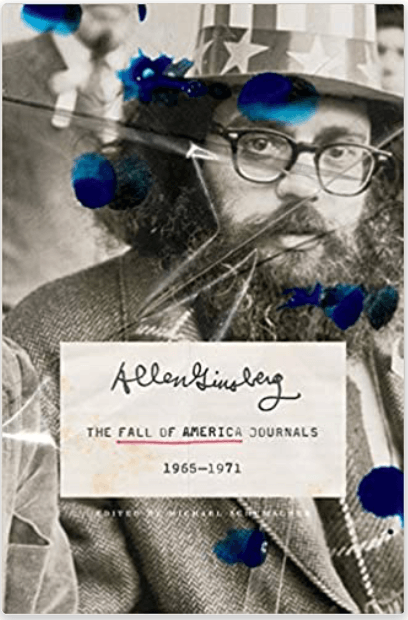Allen Ginsberg was a rolling stone. He seemed determined to gather no moss. From 1965 through 1971, he traveled the world. Mostly, though, he traveled the United States. Sometime during those journeys (presumably near the beginning of the time period), Bob Dylan bought him a tape recorder. It had to be a reel-to-reel since cassettes did not exist on the market then. Ginsberg spoke into the microphone of that machine, recording what he saw and what he thought. Somewhere along the way, the fragments of what is termed auto-poesy were transcribed. Some of its finer iterations became Ginsberg’s prize winning 1973 poetry collection titled The Fall of America: poems of these states.
This year, the University of Minnesota Press releases the journals from which that book was derived. Titled The Fall of America: Journals 1965-1971, the text is the third in a trilogy. Parts one and two described Ginsberg’s early European travels and some of his Latin American travels. Even more than the previous volumes, this particular text is, at its core, a human cry in a wilderness of products and profits whose byproducts are poisonous and pervasive. Ginsberg’s hikes in the mountains and along the beach, even his farm in upstate New York are reminders of what the planet could still be.
The Fall of America Journals begins with a description of a trek Ginsberg made with fellow poet Gary Snyder. They are hiking the wild beauty of the mountains of the US West—the Cascades, to be exact. The book finishes up a few hundred miles to the east in another mountain range and another trek to the multiple forms of beauty those ranges hold. In the pages between the mountain ranges exists what is essentially a very long poem, an epic if you will. Parts of this poem are rough as the rock one finds above the alpine line; others feature finished works flowing freely as a mountain stream. There are dreams and memories of two of his friends who died during that time —Neal Cassady and Jack Kerouac; there are also celebrations and complaints about those friends he still lived and traveled with. There are visits with other poets—most interestingly Ezra Pound who more or less acknowledges his flirtation with anti-semitism and fascism was not lunacy but stupidity. At times deeply personal and occasionally sexually explicit, the auto-poesy, the written notes and the various drafts of poems which would later appear in the aforementioned Fall of America and/or in Ginsberg’s Collected Poems describe a nation at war with the people of Indochina and itself. Ginsberg was not necessarily a political person but he, like so many others in the Sixties (and now, it seems) were compelled by the transgressions he observed to become political. The war in Southeast Asia never retreats from these pages. Instead, its weary bloodshed and hateful presence increases, occupying more lines of Ginsberg’s poetry in a manner similar to how it took over much of the world’s consciousness during those years these poems were composed. It’s present when he writes the incantation to raise the Pentagon at the October 1967 antiwar March on the Pentagon. It’s present in his poem describing the battles in Chicago’s Grant Park during the 1968 Democratic Convention; a convention marked by a Democratic Party willing to destroy itself to keep fighting the war and those who ever more aggressively opposed it. The war in Southeast Asia is also present as Ginsberg spends time at his farm in upstate New York—a place he bought for himself and his friends to get away from the madness consuming so much.
The title of the poetry collection is not meant to suggest Ginsberg wished the fall of America. It is more of an observation than a desire; more of a regret than a hope. I shared a joint with Ginsberg in 1980. Ken Kesey and Peter Orlovsky also inhaled. So did a friend of mine. I wanted the fall of America. We were in Boulder. The Grateful Dead were in town. Dozens of writers were gathered at a Naropa Institute commemoration of the publication of Jack Kerouac’s novel On the Road. In the six years since the poetry collection was published, the actual fall of America was still considered an uncertainty and a possibility. Despite the nonsense coming from the Reagan for President campaign and its sycophantic media, it was not morning in America. Instead, it was something much closer to never-ending darkness. Most citizens were mistaking the sunset for a sunrise and the deteriorating nation for a city on a hill. Ronald Reagan was a worthy huckster for the scam being pulled. Genial of face and as mean hearted as the slaver smiling while he whipped his overworked slaves, Reagan’s patent medicine of trite lies and false masculinity would keep him in the White House for eight long years.
Fall of America Journals is a book that describes America’s beauty and its bloodshed; its glories and its shame. It is a history, a road journal, a poetic odyssey with islands of magic, mountains of snow, psychedelic elixirs inducing visions. And dreams. An odyssey and an omnibus, these journals are a work meant to live on a nearby shelf, to be opened if in need of inspiration or assurance. It serves as a road atlas in a universe with multiple dimensions and numerous points of entry. Allen Ginsberg is not Virgil, but a narrator on the winding journey his words illuminate. His odyssey is not a journey driven by a desire to get back to home and hearth, but he tells it as well as Homer told us his.
PrintRon Jacobs | Radio Free (2020-10-30T07:45:50+00:00) Ginsberg’s America: an American Poet Describes an Uncertain Nation . Retrieved from https://www.radiofree.org/2020/10/30/ginsbergs-america-an-american-poet-describes-an-uncertain-nation/
Please log in to upload a file.
There are no updates yet.
Click the Upload button above to add an update.
